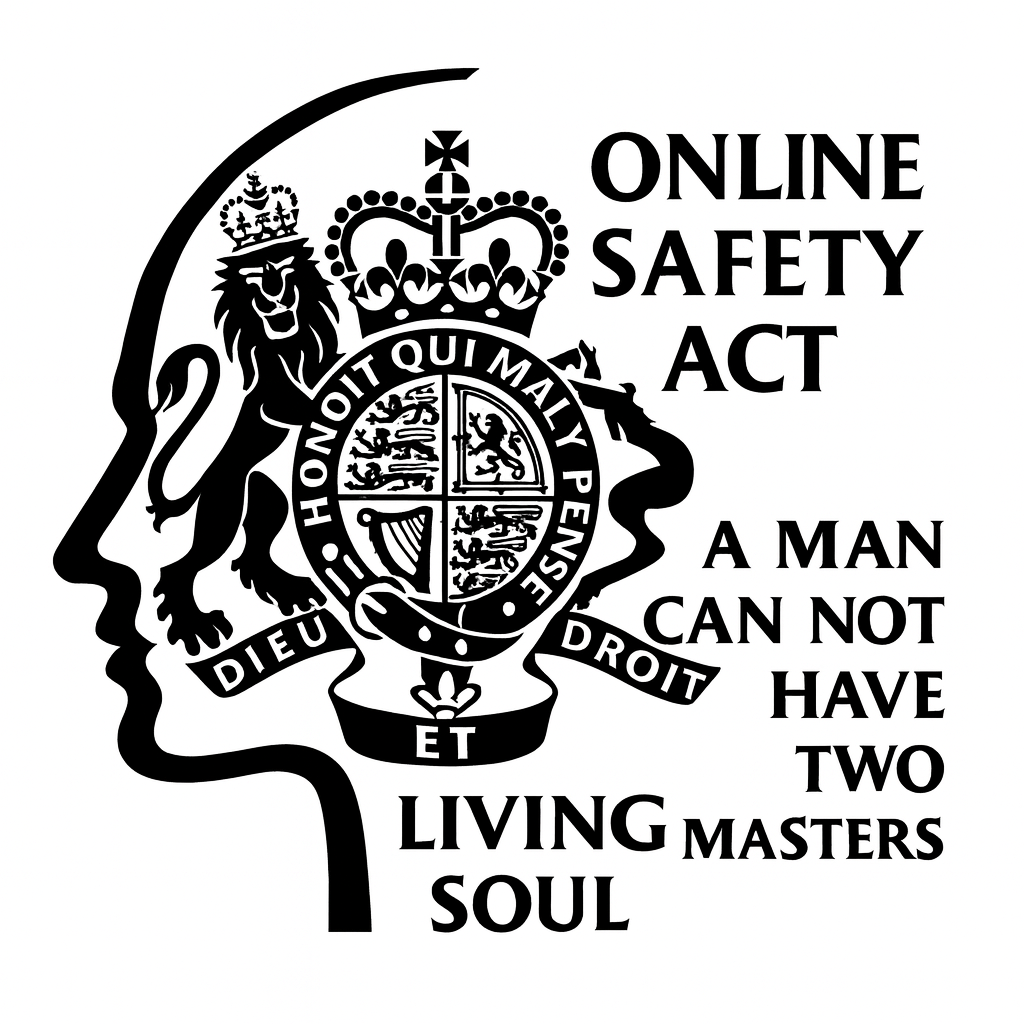Law, Acts, and the Human Being – Reflections on the Online Safety Act

*Published by a living man, not a legal fiction. A human, made in the image of God, with breath given by the Creator and accountable to Him alone.
"No one can serve two masters; for either he will hate the one and love the other, or he will stand by one and despise the other. You cannot serve both God and mammon." (Mattityahu / Matthew 6:24, Delitzsch Hebrew Gospels)
It is the same for every hu-man being (emphasis on the hu, the color or shade of man): to serve the Creator or to serve the color of man's law. No human, no matter what name is given or presumed, may serve both. One master gives freedom and life; the other brings confusion, bondage, and fear.
Disclaimer:
This article is written as the testimony of a living human being. Nothing herein is to be construed as consent, acceptance, or joinder to any statutory instrument, presumed contract, or fiction of law. No government, court, or agency may lawfully presume or assume jurisdiction over the breath, conscience, or living soul of a human on the basis of color, fiction, or statute. All rights reserved by the Creator and preserved for the living.
The Nature of Law vs. the Color of Statutes
In every age, men have been governed by rules. Some call them laws, others statutes, regulations, or acts of parliament. Yet there remains a gulf between what is truly Law and what is the color, the shadow, of law—known as statute. Law comes from above, given by God to man, eternal and unchanging: "Do not kill, do not steal, do not bear false witness." Statute, on the other hand, is the work of men: rules for managing those who register, join, or consent—knowingly or by presumption—to roles and offices crafted by governments and rulers who rise and fall with the tide of time.
It is written: "Leaders are appointed for a time, then pass away, leaving another to deal with the consequences of the statutes passed in the past." A government’s hand is seen in every act it writes, but the true Law remains unchanged, enduring long after every ruler and regime has vanished into dust.
The Online Safety Act – An Instrument of Statute
The United Kingdom’s Online Safety Act 2023 (2023 c. 50) is not Law in the higher, universal sense, but a statutory instrument—a color of law given force by presumption, consent, and the silence of those who do not rebut its claim. The Act claims to protect the vulnerable, especially children, from harm online. Its aim, as declared, is the creation of a "safer" digital world. To achieve this, the Act empowers Ofcom and other bodies to police content, mandate removal of speech, and impose fines, blocks, and even criminal liability on those deemed "service providers," "directors," or "responsible persons."
Yet, by what authority does this instrument claim such power? What statute, what royal prerogative, what ancient right granted Parliament the force to decree over the hearts, words, and actions of living men and women made in the image of God? The chain of statutory instruments grows ever longer, each one resting on the assumed validity of the one before. Yet none reach to the Law itself, and each new act further obscures the distinction between living man and legal fiction.
Human Beings vs. Legal Fictions
It must be said plainly: A human being is not the same as the name given at birth, nor is the human the legal person or corporate entity imagined by statute. The person is a mask, a role, a fiction created for the convenience of governments and commerce. The human is real—animated by the breath of God, possessing will, conscience, and the power to choose between good and evil. Only by the human's own action, signature, or silent assent does joinder to the legal fiction occur. All else is presumption, and presumption is not Law.
The Act presumes, as all statutes do, that those who act, speak, or publish in the digital realm accept the role assigned by government. It is by this presumption that living men and women are bound by statutes never personally signed or agreed. But let it be known: The authority of an Act ends where the will of the living being begins, unless that being is compelled by force—not by Law, but by power.
The Legacy of Statutes and the Weight on Future Generations
Each generation inherits the statutes of the one before, together with all the burdens, prohibitions, and penalties decreed in the name of "safety," "security," or "the public good." Yet every lawmaker passes away, and none may foresee the full consequence of their acts. The Online Safety Act, like so many before it, will remain to encumber those yet unborn, to regulate the words, thoughts, and actions of generations whose voice was never heard in its making.
If the government of the United Kingdom truly wished to protect minors from the dangers of the internet, the only sure way would be to take the internet away from them altogether. If that were done, let the adults be as they are—accountable to conscience, to community, and to the Law of God. Let us see then how long any government would endure if it presumed to dictate to every grown man and woman what they may read, write, or see, and how they must act or speak.
Guy Fawkes and the Spirit of Resistance
History is full of warnings. The Gunpowder Plot of 1605—remembered each year not as a triumph of law but as a signal of what men will do when they believe their voices have been silenced, their conscience denied. Guy Fawkes was foiled, but the spirit that moved him is never far from the heart of a people pressed too long under statutes they did not choose and cannot accept. Let the rulers of today remember: each new act passed in the name of "safety" or "order" may ignite a fire in the minds of men that no statute can extinguish.
Conclusion – Whence the Power, and Whither the Law?
Every statutory instrument claims lineage from those before it. The Online Safety Act stands as yet another link in a chain that stretches back to Magna Carta and beyond. But what instrument, what authority, granted Parliament the power to pass this Act in the first place? Was it the Crown, the people, or some older claim lost to memory? The Act may be new in its particulars, but the pattern is ancient—government seeking ever greater control, and men and women resisting, sometimes in silence, sometimes in open defiance.
Why the fuss now, if the Act is not new? Because every new step, every attempt to turn statute into Law, brings us closer to the point where each man and woman must choose: to be governed by the shadow, or to stand in the light. Let every human being, made by God, know the difference and choose with wisdom, for the world that follows will be shaped by those who understand what Law truly is—and what is only the color thereof.
Yet what is the way forward for the human being—living and breathing in a world so tangled in statutes, fictions, and ever-changing acts? It is not to escape, nor to rebel for rebellion's sake, nor to live in fear of men or governments. Rather, it is to live with eyes open: seeing the world for what it is, but not becoming of it. The world offers labels, numbers, accounts, and titles, but the living human being is more than any label or account.
Walk in the world, but do not be conformed to it. Speak truthfully. Let your yes be yes and your no, no. Use what is useful, but do not bow to what is false. If compelled by force, do not allow fear or anger to rule the heart. Trust that what is right will stand when all statutes have fallen away, and that every breath given by God is precious—too precious to be wasted in service to fiction or falsehood.
Let the reader remember: freedom is not found in breaking every statute, nor in slavish obedience to men, but in knowing who you are—a human, created in the image of God, born free and with conscience alive. Lead by example, care for others, and build what is good, so that when this age of statutes and acts has ended, something eternal remains.
Written not by a person, not by a fiction or a name, but by a living human being who owes breath and conscience to God alone. May every reader seek truth and stand fast in what is right, and may those who rule remember that their time is but a moment, soon to pass, and their acts will be judged by those who come after.
